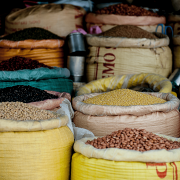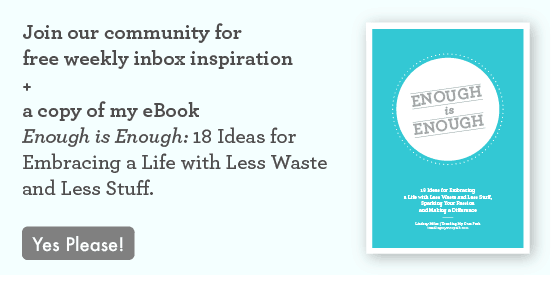Why coronavirus does not mean the end of zero waste
You may have heard stories or even seen local businesses in your area make the decision to ban reusable coffee cups, or reusable containers. I first heard about this when Starbucks made the decision at the beginning of March to not only refuse reusable coffee cups but also switch all dine-in reusables (cups, plates, cutlery) to single-use disposables.
(Although interestingly they will – at the time of writing – still accept your pre-handled money, unlike other stores which are now also banning cash and allowing only contactless payments).
Around the same time I heard that Bulk Barn, the largest bulk foods store in Canada, is no longer allowing single-use containers. Now, more and more places are announcing similar policies. And I started seeing people ask – is this the end of zero waste?
No, coronavirus is not the end of zero waste. Here’s why.
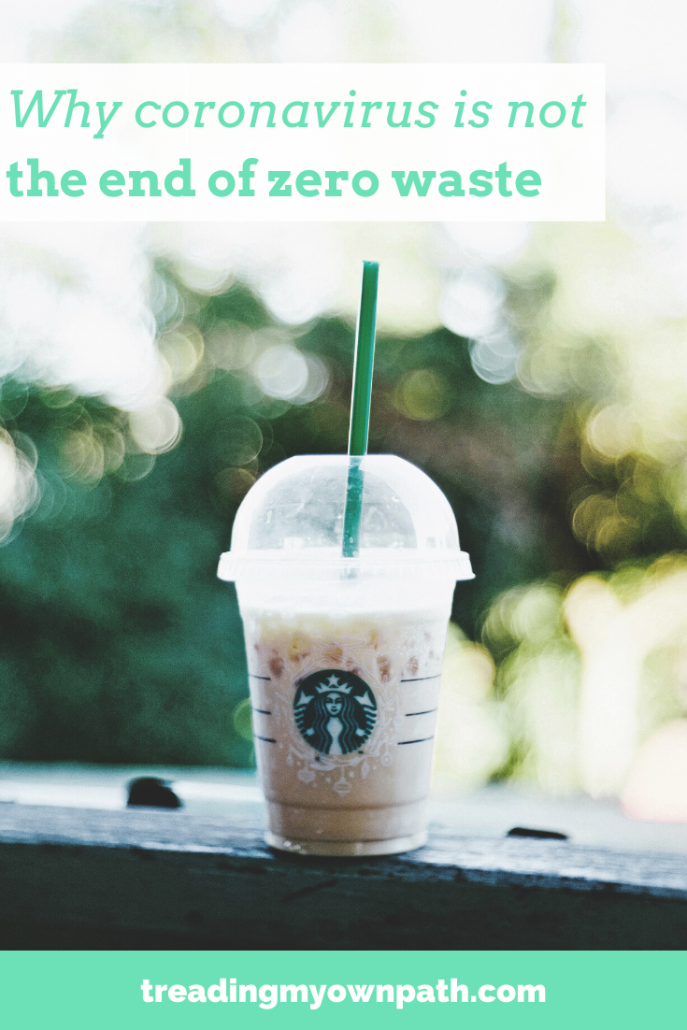
Coronavirus and the rise of single-use disposables
Before I even begin, I want to emphasise that we are in a unprecedented situation, and it is hard for any business owner to know how to react or what to do to reduce the spread of disease and keep their business running. I think many stores want to do ‘something’ and without clear guidelines as to what this might be – other than shutting doors, which isn’t an easy business decision even if it’s great to prevent the spread of disease – they are trying to take action however they can.
So we might have our opinions on what is inconsistent and what is overreacting and what is sensible and what is necessary. But they are just our opinions, and even the experts are in unchartered territory right now.
Something I read at the weekend that really stuck with me was this: “When you’re dealing with exponential growth [which is what experts are saying we have with infection rates] the time to act is when it seems too early.”
So let’s save our judgement, because we really don’t know.
But what I know to be true – whether we see more and more businesses switching to single-use disposables over reusables because of coronavirus, and even if those businesses decide to keep policies in place after the threat has passed (assuming that it does), is that it doesn’t spell the end of zero waste.
As so often happens in the media, it is being framed all wrong.
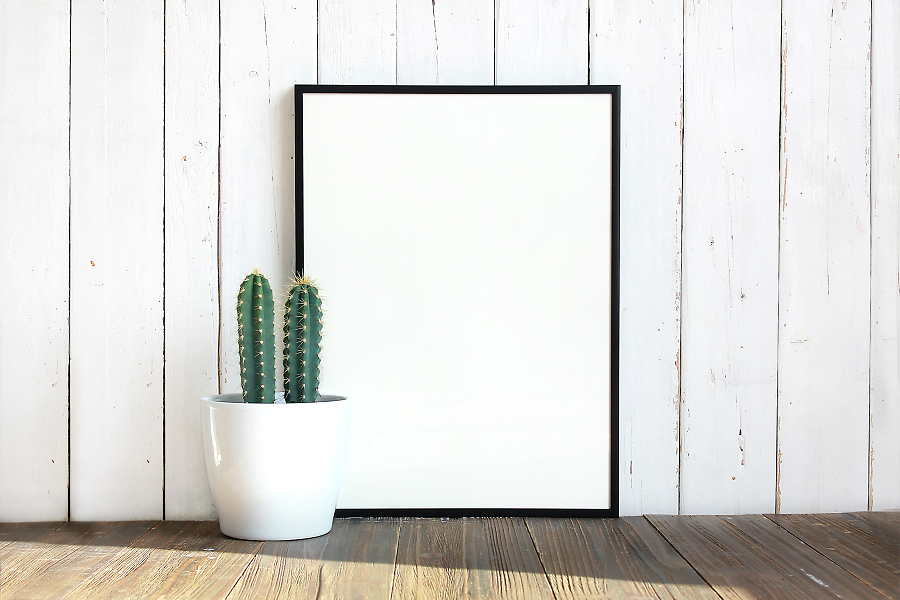
Coronavirus can’t touch what zero waste really is
We could have a conversation about what ‘waste’ really means, and whether single-use disposables are truly a ‘waste’ if they are helping reduce the spread of disease.
(After all, almost all of us would argue that hospitals are a great place to use single-use plastic, for exactly this reason.)
But we are not going to have that conversation. Because that keeps the conversation around reusables, and anyone who has been trying to live low waste or zero waste for more than about five minutes knows that the choices we make and habits we form are so much more than reusable coffee cups and takeaway containers.
Zero waste is not – at its heart – about reusables. Zero waste is a mindset. It’s an attitude, a philosophy, a goal, whatever you might prefer to call it. Reusables make zero waste living easier, but they aren’t a make-or-break.
The idea that zero waste is over because we can no longer purchase takeaway coffee from a multinational corporation in a reusable cup is missing the bigger picture. Takeaway coffee generally – there are bigger issues, when it comes to waste. Yes, as a society (well, in western parts of the world, and for the more privileged part of society) we might drink a lot of takeaway coffee, but it’s a small part of the global waste footprint.
Regardless, it is disheartening to see businesses take a step backwards (in terms of sustainability) and make these choices – even when they are justified for other reasons.
Rather than feel frustrated, I wanted to remind you of all the ways that we can try to live with less waste. Because there are plenty of things we can still do, and I like to focus on the positive (and the practical).
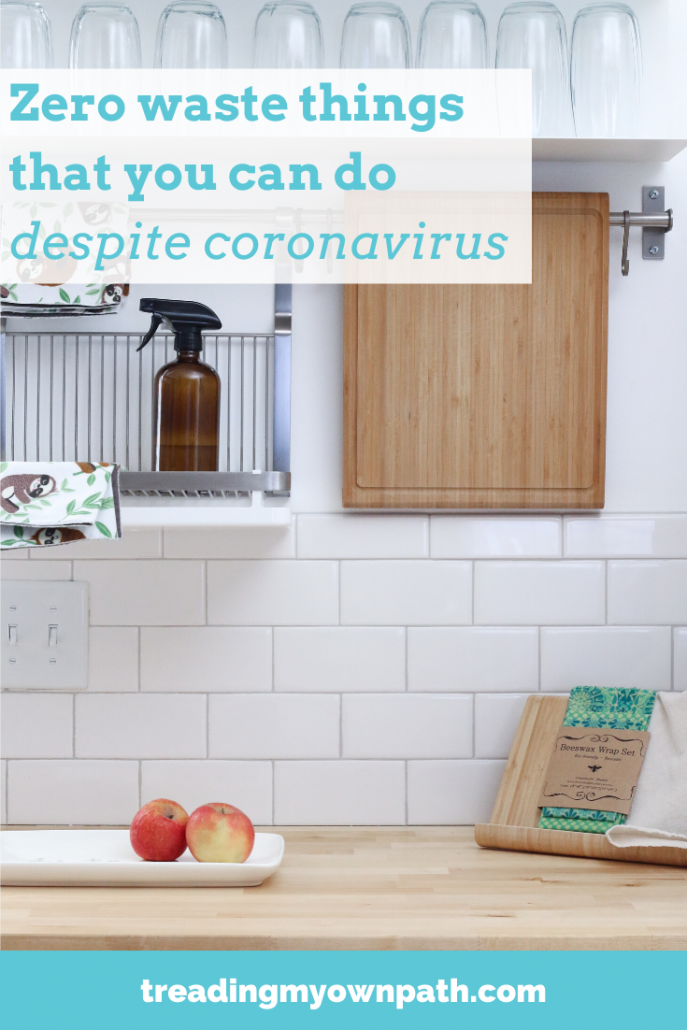
Zero waste things you can do in spite of coronavirus
Think creatively about the packaging you need to use. You might not have a choice about being able to use your own containers to the store. You might not currently have a choice with which store you buy your groceries from (if your preferred or regular store has run out of what you need). But maybe you can think creatively about what you buy or how you buy it to reduce your packaging (particularly single-use plastic).
Could you choose the unwrapped produce? The bigger pack sizes? The options without individual packs inside packs? The brands packaged in cardboard? Could you by in bulk (rather than from bulk) and split a larger amount with friends or family? If you can’t do it all, go for the small wins. It all helps.
Make something from scratch. Whether you simply haven’t been able to get something you usually buy pre-prepared, or your simply faced with more at-home time than you’re used to, now is a great time to learn to make something from scratch. Been wanting to try DIY nut milk since forever? Wondered about making bread, or crackers? Fancy giving DIY moisturiser a go?
Perhaps you can use this situation as an opportunity to try ‘one more thing’.
Reduce your food waste. You might not be able to choose whether or not you can BYO packaging, but you can work to ensure you’re not wasting the food that you buy. With the panic buying we’re currently seeing, it makes even more sense to ensure we are using up what we actually buy before it goes bad.
Make sure you are storing food properly so that it lasts, clear out your freezer to make room for leftovers, make a ‘use me first’ shelf in the fridge so everyone in your household knows what needs eating first.
(I’ve got a free resource coming soon all about reducing food waste, so keep your eyes peeled.)
Compost your food scraps. This is different to reducing food waste. This is ensuring that those inedible bits (cores, pips, stems, outer leaves etc) are not put into the landfill / general waste bin. Whether you can set up a system at home – I’ve written about composting, worm warms and bokashi systems if you’d like to know what your options are – or whether you make the most of community composting services, this is a great way to reduce waste.
Now is a great time to set something up – or at least start doing the research.
Buy less stuff. The best thing you can do to reduce your waste is to buy less stuff. Even ‘sustainable’ stuff has a footprint. A big part of the zero waste lifestyle is making do, and making things last. Maybe that means getting stuff fixed. It’s extremely unlikely you’ll never need to buy anything again ever – but as a general rule, the less you buy, the more sustainable you are and the less waste you create.
If you need something, see if you can borrow, or find it for free on Freecycle, Freegle or Buy Nothing. Libraries don’t just lend out physical products, they lend out ebooks, online movies and electronic versions of magazines too – so even if you can’t get to your physical library, you might have options. If you need to buy something, check out the second-hand options first.
(Whether this is possible will depend on what it is and where you’re living – and what the isolation restrictions are – but it is still a consideration).
If you do need to buy something brand new, don’t feel guilty about that. There are better ways to use your energy. Just try to make those purchases mindfully.
Learn more about the issues you care about. You might not be able to take action now in all the ways you’d like, but you can use this time to read up on topics that interest you, try out some new skills, and connect with like-minded people (even if only online, for now).
There are so many great books (or ebooks and audiobooks) and useful blog posts. And courses and videos. And social media pages and groups.
Take the time to get informed.
Write letters and apply pressure to those in power (or make a plan to). It might seem like an inopportune moment to be hassling your supermarket about their single-use plastic packaging policy, or asking your local government member to support a plan to divest in fossil fuels, but these issues aren’t going away, even if they are buried under more pressing needs.
(In fact, some governments and companies are using the fact that others are distracted to push through unpopular decisions, such as the announcement this week by the Victorian government to lift the moratorium on onshore drilling for gas.)
If you have the time and headspace, you might want to use it to start (or continue) to apply pressure on businesses, organisations or government officials to demand change, or ask for answers on policy and decision-making.
You don’t have to send any letters or emails you write straightaway. If the timing seems insensitive or you know it won’t be looked at, you can prepare for when things are settled, do your research, and be ready to go.
Keep supporting your local zero waste store, or independent local businesses, even if they temporarily have to change their policy and disallow reusables. You’ll want them to be there when things get back to normal, so keep supporting them whilst things get tough.
It’s a lot easier for big multinationals to weather disruption than small stores. They need our help.
…
I don’t want to sugar coat anything – we are in the strangest of times. There are lots of things to be concerned about. But multinational companies opting for disposable coffee cups isn’t one of them. We are better placed focusing our energy elsewhere.
Now I’d love to hear from you! How are you feeling about waste and sustainability issues – have they slipped from your radar, are they there in the back of your mind, or are they at the forefront? Are you coping or are you struggling right now? There’s no right or wrong answers here and definitely no judgement so tell us how you’re feeling and where you’re at, and share any ideas or thoughts in the comments below. We’re in this together.

